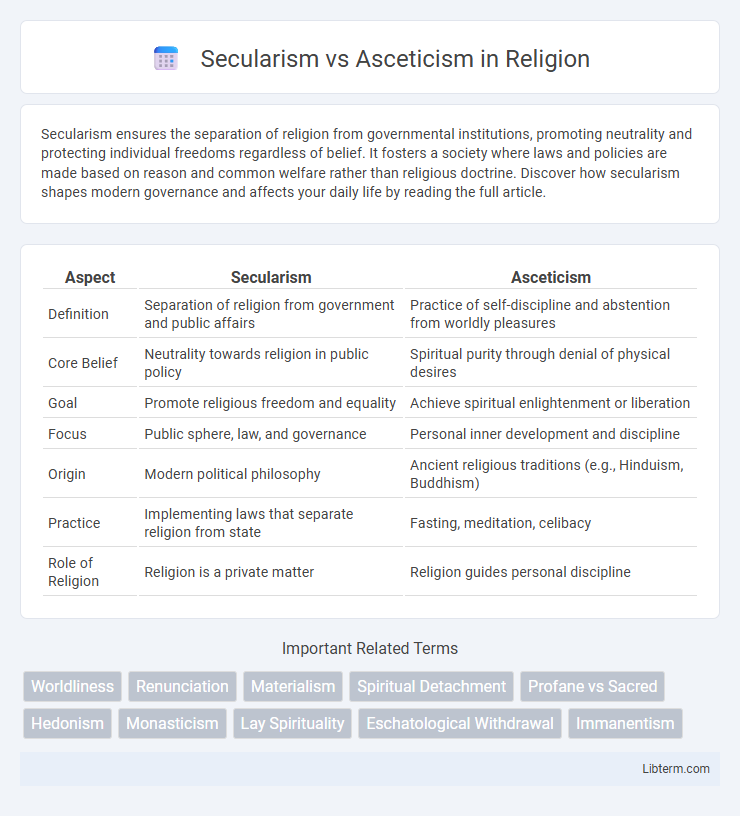Secularism ensures the separation of religion from governmental institutions, promoting neutrality and protecting individual freedoms regardless of belief. It fosters a society where laws and policies are made based on reason and common welfare rather than religious doctrine. Discover how secularism shapes modern governance and affects your daily life by reading the full article.
Table of Comparison
| Aspect | Secularism | Asceticism |
|---|---|---|
| Definition | Separation of religion from government and public affairs | Practice of self-discipline and abstention from worldly pleasures |
| Core Belief | Neutrality towards religion in public policy | Spiritual purity through denial of physical desires |
| Goal | Promote religious freedom and equality | Achieve spiritual enlightenment or liberation |
| Focus | Public sphere, law, and governance | Personal inner development and discipline |
| Origin | Modern political philosophy | Ancient religious traditions (e.g., Hinduism, Buddhism) |
| Practice | Implementing laws that separate religion from state | Fasting, meditation, celibacy |
| Role of Religion | Religion is a private matter | Religion guides personal discipline |
Understanding Secularism: Definition and Origins
Secularism refers to the principle of separating religious institutions from governmental entities and public affairs, promoting a neutral stance on religion to ensure freedom of belief and equality. Originating during the Enlightenment era in 17th and 18th century Europe, secularism emerged as a response to religious conflicts and the dominance of the Church in political and social life. Its foundational concepts include the denial of religious influence in public policy and the advocacy for a society governed by reason and empirical evidence instead of spiritual doctrines.
Defining Asceticism: Historical and Philosophical Roots
Asceticism, rooted in ancient religious traditions such as Hinduism, Buddhism, and Christianity, embodies rigorous self-discipline and renunciation of worldly pleasures to attain spiritual enlightenment. Historically, figures like the Buddha and early Christian monks practiced asceticism to transcend material desires and achieve higher states of consciousness or divine connection. Philosophically, asceticism emphasizes the rejection of sensory indulgence as a pathway to inner purity, self-mastery, and ultimate liberation from suffering or attachment.
Core Beliefs: Secular Values vs Ascetic Principles
Secularism emphasizes reason, individual rights, and the separation of religion from public affairs, promoting values such as equality, freedom of thought, and empirical evidence. Asceticism centers on self-discipline, renunciation of worldly pleasures, and spiritual purification, valuing detachment from materialism and practicing austerity. The fundamental contrast lies in secularism's focus on worldly engagement and humanistic ethics versus asceticism's pursuit of inner transcendence and restraint from sensory indulgence.
The Role of Religion: Separation vs Spiritual Discipline
Secularism emphasizes the separation of religion from public institutions and governance, promoting a neutral space where religious beliefs do not influence laws or policies. Asceticism centers on spiritual discipline through self-denial and rigorous practices aimed at achieving personal enlightenment or religious purity. The role of religion in secularism is minimized in societal functions, whereas in asceticism, religion is integral as a guiding framework for individual spiritual development.
Secularism in Modern Society
Secularism in modern society promotes the separation of religion from government institutions and public policy, ensuring that laws and education systems operate independently of religious doctrines. This principle supports pluralism by allowing diverse cultural and religious identities to coexist without state favoritism or influence. Emphasizing rationality and individual rights, secularism fosters an inclusive environment where scientific progress and human rights thrive free from religious constraints.
Asceticism Across Cultures and Traditions
Asceticism, a practice characterized by self-discipline and abstention from worldly pleasures, appears prominently across cultures such as Hinduism, Buddhism, Jainism, and Christianity, each emphasizing spiritual purification through renunciation. In Hindu traditions, ascetics known as sannyasis undertake rigorous austerities to achieve moksha, while Buddhist monks follow the Middle Path balancing ascetic practices to reach enlightenment. Jain asceticism is marked by extreme non-attachment and strict vows of non-violence, highlighting the diversity and depth of ascetic disciplines across global religious landscapes.
Individual Freedom: Secular Autonomy vs Ascetic Restraint
Secularism champions individual freedom through secular autonomy, promoting personal choice and independence from religious or doctrinal constraints. In contrast, asceticism emphasizes self-discipline and restraint, often limiting personal freedoms to achieve spiritual growth or moral purity. The tension between these paradigms highlights the balance between embracing liberty and pursuing purposeful self-control.
Impacts on Ethics and Morality
Secularism promotes ethics and morality based on reason, human rights, and social contracts, fostering inclusivity and adaptability in diverse societies. Asceticism influences morality through self-discipline and renunciation, emphasizing inner purity and detachment from material desires to achieve spiritual growth. Both frameworks shape ethical behavior, with secularism prioritizing communal welfare and asceticism focusing on personal virtue and transcendence.
Social Implications: Community, Law, and Governance
Secularism promotes a pluralistic community by separating religion from law and governance, ensuring equal rights and freedoms for diverse belief systems under a unified legal framework. Asceticism influences social structures by encouraging minimalism, self-discipline, and detachment from material wealth, often impacting communal norms and ethical governance within spiritual or monastic societies. The contrast between secular governance and ascetic values shapes legal policies on religious freedoms, social welfare, and public morality, directly affecting social cohesion and political stability.
Secularism and Asceticism: Conflicts and Convergences
Secularism promotes a separation between religion and state, emphasizing rationalism and individual freedoms, whereas asceticism advocates for self-discipline and renunciation of worldly pleasures often rooted in religious traditions. Conflicts arise when secular policies limit religious practices intrinsic to ascetic lifestyles, challenging the autonomy of ascetics within public spheres. Convergences appear in shared values such as simplicity and rejection of materialism, suggesting potential dialogue between secular ethical frameworks and ascetic principles.
Secularism Infographic

 libterm.com
libterm.com